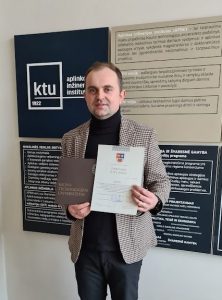Recently, he defended his PhD dissertation at KTU Institute of Environmental Engineering. Julius Denafas tells what motivated him to enter PhD studies, how the results of his PhD dissertation research serve in the processes of the company he manages, and what he thinks about Lithuania’s circularity.
Julius, tell a little about what motivated you to start PhD studies?
I did not go to PhD studies immediately after graduating from the master’s program. It was important to me that my PhD studies be linked to my work activities so that they bring real benefits, so I waited for the right moment. At Soli Tek R&D, we have been working on R&D activities in the field of solar energy, working closely with various research centers, so thoughts about doctoral studies have been on my mind for some time. During the Horizon 2020 project tasks, I saw that there were activities for which there were no suitable conditions at work, lack of scientific knowledge in the field of the environment, and so on. So I thought that this was probably the right time to get into PhD studies, and I realized that these studies could perfectly fill all the gaps I encountered at work.
Why did you choose KTU Institute of Environmental Engineering (APINI)?
The activities of the APINI Institute were most in line with the theme of my research, which was essentially the application of the principles of the circular economy in solar energy. APINI has a lot of experience in this area and conducts various researches. That was the main reason. I also noticed that there wasn’t much research in solar energy specifically at the time, so I hope I expanded the areas the institute works on a bit during my PhD studies.
Tell us briefly what your PhD dissertation is about?
In short, this dissertation presents the results of my research on how to change the production processes of solar cells in order to significantly reduce their negative impact on the environment. To demonstrate this, I mainly worked on the application of production technology to use recycled silicon and on changes in diffusion, anti-reflective coating processes, and so on. The technological work was significantly supplemented by life cycle calculations, thanks to which the results were also evaluated from the environmental point of view.
 How does the topic of your PhD dissertation relate to your work at Soli Tek R&D? Will you try, or have you already started to apply the research results of your dissertation in the company’s processes?
How does the topic of your PhD dissertation relate to your work at Soli Tek R&D? Will you try, or have you already started to apply the research results of your dissertation in the company’s processes?
The topic is really related. All technological experiments presented in the dissertation were performed on the company’s production line, some of them have proved their worth and are currently applied in production. Recycling of the solar cell and the recovery of materials such as silicon and silver are very important topics, so we plan to continue research in this area.
The circular economy. The topic is very relevant at the moment, because, as we know, by 2050 the EU is striving to make the economy climate-neutral, and Lithuania’s circularity is currently only 3.3%. Your dissertation is also very closely related to the circular economy. What actions do you think are most important for Lithuania at the moment to increase this circularity rate? How can we each contribute to this?
Well the first thing would probably still be education. Starting from the smallest – in kindergartens or primary schools. There should be more talk about the environment, the circularity in various areas of life, so that more people in society understand what circularity is and how to apply it, and how it benefits not only the planet but also each of us. With regard to the industrial sector and manufacturing companies, I believe that the successful application of the principles of the circular economy requires the creation of both technological and economic conditions. It is very important to encourage further research, to create the necessary financial mechanisms to increase the incentive for industry to transform their business to less environmentally damaging processes, raw materials, and so on. If industry feels that the development of the circular economy and the application of its principles will bring not only environmental but also economic benefits – then I think we all have the better future.